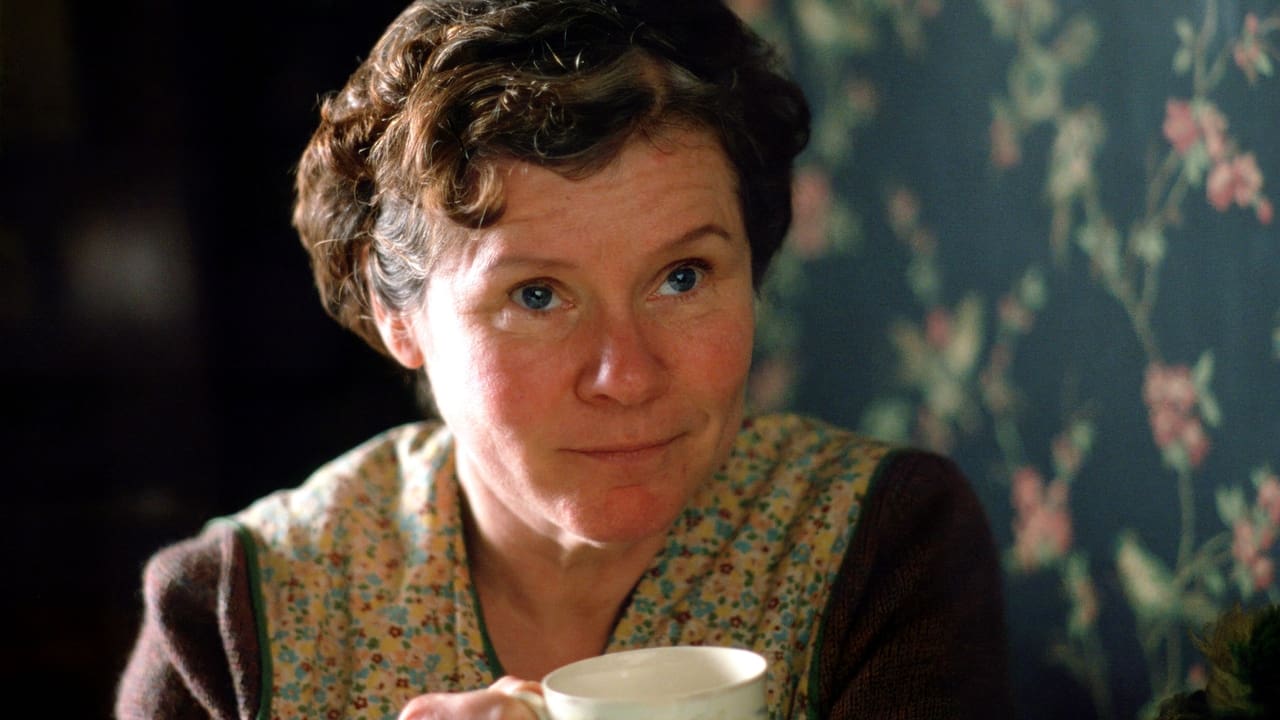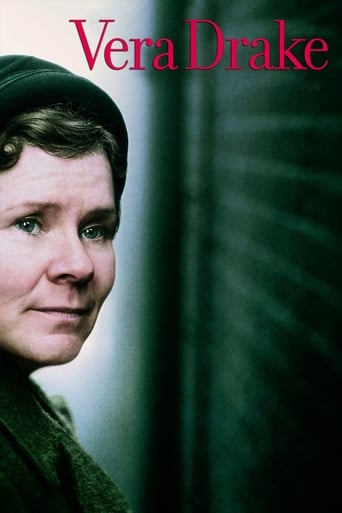

On the surface it looks simple: a "realistic" movie depicting 1950 London and portraying a kind character fighting unfair anti-abortion laws. But is it just that?REALISM TRANSCENDED BY IMAGE Granted, the historical reconstitution is convincing. Exteriors and interiors are life-like. Social types are well outlined. However Mike Leigh sublimes this realism, providing an archetypal rendering.Colours and lighting have a purpose: showing the opposition of living standards. On the one hand, cold colours and dim lighting for middle and lower classes: dwellings, workplaces, etc. On the other, warm colours and bright lighting for upper classes and institutions: homes (including Frank's), doctor, psychiatrist, clinic, courtroom, jail, etc. This contrast is by no means "natural": notably, the brightness in jail is surprising.The camera emphasises this opposition: we seem to bump into walls and persons at Vera's home; shots are close, camera movements are rare as if we could barely move. In contrast, in the bourgeois' home, shots are more distant and the camera moves as if to benefit from available space.This sublimed vision has an objective: going beyond the description of a period to deal with universal themes, i.e. social classes, money, abortion, justice, values. AND BY ACTINGMain actors rehearsed extensively before shooting started: lengthy discussions about script and characters, thorough documentation about the period and personalities, improvisation of scenes that were afterwards used in the movie or not. This largely explains the "real life" feeling of the movie.However, just as noted above for image, this acting method transcends roles: actors do not just portray historical persons, they enrich characters with their own personalities and emotions. Immersion is a two-way street: actors grow into roles and inversely characters are modelled on actual individuals. This provides extra depth to characters and makes us feel closer to them: they are just not bygone persons, it seems we could meet them nowadays.It has been said many times, nonetheless let's repeat: Imelda Staunton's performance is absolutely outstanding and explains to a large extent the quality of the movie. Other actors are also excellent, even in minor roles.CHARACTERS WE CAN CONNECT TOAll characters are sympathetic with only two exceptions: Lily who immorally profits from abortions and black market; Joyce who is rigid and greedy. This approach is intentional: we understand how everyone thinks. A doctor informs the police, but has no choice. The police arrest Vera, but are decent. A mother gives Vera away, but only after undergoing pressure from the police. A doctor and the psychiatrist benefit from the abortion "business", but are confined by the system. The magistrate is ruthless, but complies with the law.Conversely, if Vera is kind, she is not a saint, which prevents the movie from being one- sided. She means well, however her methods are dangerous: because of her a young woman almost dies. Technically she "helps young girls out", yet fails to deliver an essential psychological support: once finished she goes rapidly, leaving the despaired women alone. She is so naive she does not understand her "friend" Lily is exploiting her. She does not evaluate the consequences of her action, notably for her family who at the end is left morose.ABORTION: IS THE MOVIE PRO-CHOICE?The movie is not a straightforward pro-choice manifesto. We hear arguments from both sides. On the one hand, the friendly Sid cannot understand nor forgive what Vera has done. Even the fair Stan and Frank do not take sides. There is a general condemnation of abortion.On the other, wealthy families can bypass the law, while poor or even middle-class families cannot. Because abortions have to be illegal, a woman almost dies. Reg delivers a powerful quote: "It don't seem fair. Look at my mom: six of us in two rooms. It's all right if you're rich, but if you can't feed them, you can't love them, can you?" Hence the message is pro-choice in the context of social inequalities. Is this message universal? Each spectator will decide for oneself.We witness seven abortions (of which six performed by Vera) in different contexts, which illustrates the complexity of the topic: rape, inability to raise another child, infidelity (probably), prostitution (probably).COMPELLING SCENESI believe every major movie has at least a prominent scene, condensing its main qualities. "Vera Drake" has two. The first one is when the police arrive at Vera's home. We go through a roller-coaster of emotions: surprise, incredulity, fear, despair, resignation. The dialogue between the inspector and Vera is exceptionally intense, highlighted by sharp reversed shots.The other scene is at the police station, when Vera reveals to her husband Stan what she has done. At first, two officers are in the background. Slowly, the camera zooms in Vera and Stan: one officer moves off-screen. Then Vera bends over to Stan, hiding the other officer: Vera's action has turned from unlawful to personal. There is an incredibly tense moment when she cannot voice what she did while he eagerly waits for the revelation. Finally she whispers to his ear something we cannot hear: her action is beyond audible words.DRAMATIC BUILD-UPThe movie progressively moves from a light to a dark mood. It first depicts the modest but happy life of a woman and her family. There are a few humorous moments: Sid tailors a suit for a half-wit, the family gathers, they go to the movies. Increasingly, sad events disrupt this ambiance: Vera takes care of a poor family and her ill mother, she performs illegal abortions, a woman is raped, Vera is arrested. It then goes completely downhill until the final twist: in jail, Vera realises that illegal abortions are commonplace and that the horror of being imprisoned seems trivial to many women.In summary, "Vera Drake" manages to reconcile opposites: simple yet powerful, realistic yet artistic, meaningful without propaganda, intense without exaggeration.
... View MoreDon't give up! This movie starts incredibly slowly and boringly, but ramps up the pace and drama the more it progresses. Ultimately turns out to be a very powerful drama, and an exploration of 1950s prejudices and hangups (some of which, unfortunately, still exist today). Though the movie is clearly meant to spark thought and discussion on abortion, director Mike Leigh doesn't really take a stance. In some ways this is good, as it means you can enjoy the movie as a drama, no matter what your view on abortion. In some ways, however, I wish Leigh had taken a stance (preferably pro-choice), just to make it more controversial. Imelda Staunton is superb in the lead role and deserved her Best Actress Oscar nomination (losing out to Hillary Swank for Million Dollar Baby). A powerful movie. Just be patient.
... View MoreI've only seen a few Mike Leigh films, and have pretty much liked all of them (his last recent four, and I've liked them more and more with each newer film). So ranking his last four, this is my least favorite of his. It's probably his bleakest in terms of pure melodrama. Like in his other films, a big reason this works is because of Imelda Staunton. She does some powerful work here, although at times she plays things a little too slight. Overall, it's a very good performance, great even, but sort of disappointing after all of the hype and acclaim. overall, this is very much recommended, even if it doesn't build itself as coherently as I would've wanted. Still worth a watch.
... View MoreWhy don't you "Put the kettle on" on and read this review of director Mike Leigh's 2004 drama that is very engaging and very British. He won numerous awards along with actress Imelda Staunton, while also being nominated for dozens more.Taking place in early 1950s London, Staunton gives a jolly good performance in a career defining role as Vera Drake, a woman who "helps" out other women who can't manage. This helping involves performing illegal abortions. Before you start judging her, we see her as the absolute model of perfection. She cleans houses, cares for her elderly mother as well as her own family. She has a husband and two grown children (Ethel and Sid) who all live in a cramped flat with barley enough room to turn around. Vera is so kind, loving and generous you are reminded of Mary Poppins. Repressed childhood trauma and a need to help people led her down this path.She has done this for many years and has never taken any money for doing it. Her long time friend Susan brings her the address of a woman in need and Vera arrives with her bag of tools. "First thing we do is put the kettle on". We see Vera visit a number of women all of whom deal differently with their situation. Some are doing it for the first time, while some are disturbingly use to it. Vera rationalizes her actions by feeling she is doing good and helping women at the most dire hour.When a young girl becomes ill and needs to be hospitalized, Vera's life and spotless reputation is about to be aborted as well. During her daughter's engagement dinner the police coming knocking, and Vera has a huge "oh sh*t" moment. The film then takes a strong emotional turn as her family has to deal with this secret life of hers. At the police station she admits to everything and signs a full confession. For the rest of the film Vera is in a state of shock and disbelief. Her bail is posted but her family life will never be the same. Her son Sid is disgusted by what she has done and refuses to be in the same room with her, while her daughter is sheepish but supportive. Her husband is torn and bewildered but remains supportive as well. This brings us to a very awkward Christmas celebration in contrast to the very joyful and lively engagement party from earlier (before the police crashed it). Vera eventually goes on trial and is sentenced.Although she does perform these abortions Vera is not a monster, she is not a leftist radical. She is a sympathetic mother of mercy to countless women. Because of the subject matter this film will no doubt divide people but the character of Vera Drake is one to remember.In recent years Imelda Staunton can be seen playing Dolores Umbridge in the Harry Potter movies.
... View More